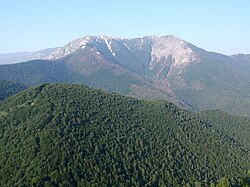Battle of Dobro Pole
| Battle of Dobro Pole | |||||||
|---|---|---|---|---|---|---|---|
| Part of the Vardar Offensive, Balkans Theatre of World War I | |||||||
 Tzena mountain |
|||||||
|
|||||||
| Belligerents | |||||||
|
Central Powers: |
Entente Powers: |
||||||
| Commanders and leaders | |||||||
|
|
|
||||||
| Units involved | |||||||
|
11th German Army 2nd Bulgarian Division 3rd Bulgarian Division |
Allied Army of the Orient Armée d'Orient 1st Serbian Army 2nd Serbian Army |
||||||
| Strength | |||||||
|
158 Artillery Pieces |
566 guns |
||||||
| Casualties and losses | |||||||
|
+3,000 (POW) +50 Artillery Pieces |
|
||||||
The Battle of Dobro Pole (Serbian: Битка код Доброг Поља, Bitka Kod Dobrog Polja, Greek: Μάχη του Ντόμπρο Πόλε, Máchi tou Dómbro Póle), also known as the Breakthrough at Dobro Pole (Bulgarian: Пробив при Добро Поле, Probiv Pri Dobro Pole), was a World War I battle, fought between 15 and 18 September 1918. The battle was fought in the initial stage of the Vardar Offensive, in the Balkans Theatre. On September 15, a combined force of Serbian, French and Greek troops attacked the Bulgarian-held trenches in Dobro Pole ("Good Field"), at the time part of the Kingdom of Serbia (present day Republic of Macedonia). The offensive and the preceding artillery preparation had devastating effects on Bulgarian morale, eventually leading to mass desertions.
Despite being outnumbered and poorly equipped, certain Bulgarian units offered fierce resistance, delaying the Entente advance in Zborsko. The collapse of the front-line enabled the Allies to assault Bulgarian positions from multiple directions and eventually quell the last pockets of resistance. The Central Powers' defeat at the Dobro Pole played a role in the Bulgarian withdrawal from the war and opened the way for the subsequent capture of Vardar Macedonia.
The 28 June 1914, assassination of Austro-Hungarian heir presumptive Archduke Franz Ferdinand precipitated Austria-Hungary's declaration of war against Serbia. The conflict quickly attracted the involvement of all major European countries, pitting the Central Powers against the Entente coalition, and starting World War I.
...
Wikipedia
